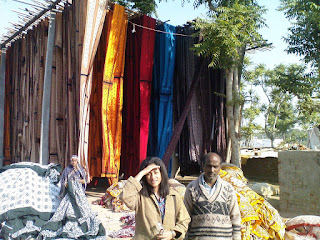Block printed fabric and clothing is very popular in India and I, like others, love the gorgeous prints they come in. But I never realized the work that goes into this process till last December when I was able to make a trip to Sanganer in Rajasthan. The city is famous for its dyeing, block printing and embroidery work. The block printing usually has floral motifs with basic colors in scarlet, black and brown. But the use of synthetic dyes is now making it possible for stunning combinations of purple and orange, scarlet and pink, turquoise and green in intricate patterns and designs. I came away with a totally new appreciation for this age old art form.
As I enter the factory area I noticed these fabrics spread out on the ground. Believe it or not, this is what they do to test the fastness of the color and the strength of the cloth. Cars and scooters happily drive all over them.
The raw fabric as it arrives from Mumbai waiting to be bleached by immersing in a gentle bleaching solution. It is then dried and measured by the meter before being sent for dyeing.
The fabric is passed thru the dye vat, while it is rolled between 2 hand cranked rollers, positioned on either side of the dye vat
After the fabric is dyed it is once again hung up to dry
Bales and bales of fabric
Gorgeous shades of red, crimson, vermillion
The guy above the rafter is hanging the fabric. It is a long, dangerous, painstaking process
Fabric laid out on long tables getting screen printed fastened with pins on the 4 corners
After printing the fabric is sent to washing units where it is immersed in a light soapy solution and rinsed three times.
Tie dye/batik cloth, long lenghts tied up waiting to get dunked in the dye again
The bleached dyed yarn before it is tie dyed
Some of the blocks used. The blocks are made of sheesham wood. The design is traced onto the surface and then chiseled to a depth of a third of an inch. The surface is planed before being carved.

















1 comment:
Wow! What a great informative collection, I really enjoyed. Also i would like to ask other users to see it, if they have a time.
fort lauderdale printers
Post a Comment